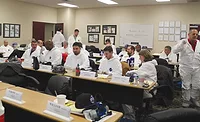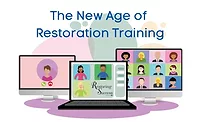Harnessing the Power of Experiential Learning in your Training Programs

GlobalStock/iStock / Getty Images Plus via Getty Images
Training is an important function in any operation and is critical to our companies’ effectiveness and efficiency. It has a direct impact on our key objectives from profitability to customer service. For all individuals training is critical to their success, growth, and morale. Field experience, on the job training, and apprenticeships are a few types of experiential learning that we likely already employ.
This holds true through all industries and professions. It is happening on an on-going basis whether we are deliberate about it or not. You can draw a parallel to programs for electricians, plumbers, physicians, and our industries and professions. Can we better harness the power of this type of learning and improve our outcomes? Yes, we can.
In How to Train Someone From Outside or Inside the Restoration Industry, “experience” is part of our training process. Even if you are not proactively managing or executing experiential learning in your organization, it is happening and natural. Your organization likely already respects and values experience. It may be a requirement of positions that you are filling, or a qualification when someone is being considered for advancement.
Experiential Learning is an entire field of study in and of itself. There are many great resources readily available to learn more about it, Northern Illinois University, Center for Innovative Teaching and Learning provides the following overview.
You can relate to the value of experience when you reflect on your own professional journey, observe the team, or consider apprentice and intern programs. The concept applies to all positions and skills in your organization.
A few of the benefits of experiential learning are:
- The more we do things the faster we get. This applies to a wide variety of skills from keyboarding, estimating, processing contents, or setting equipment in a water loss.
- Learning is enhanced when someone can apply information in an experience-based format.
- Our ability to troubleshoot and manage complexities often derives from experience.
- Have you ever reflected on how you said something or handled a situation? Most soft skills are developed through experience and reflection.
- Learning from mistakes is a cliché for a reason.
The following are some easy-to deploy tips to get the most out of your experiential training:
-
Define with trainees
- Objectives
- Timelines
- Define specific experiences
- Define specific skills and abilities to be gained
-
Assessments and Documentation
- Mentors, supervisors, tools to check in throughout the learning processes.
- Assessments can be utilized to both evaluate the outcomes and document the training.
-
Audits, QC, and/or Reviews
- If using real work and jobs for training, develop checks and balances so that customers and the company are not impacted by a trainee’s lack of experience. A few examples:
- Estimator — estimate reviewed by a seasoned estimator before submittal.
- Water Tech — allow the trainee to set up the equipment, perform other duties, come back, adjust, and explain why you may have made changes to the set up.
- If using real work and jobs for training, develop checks and balances so that customers and the company are not impacted by a trainee’s lack of experience. A few examples:
-
Training Culture
- Training Overhead: This is a consideration when your field trainers also have the responsibility for job profitability. Allow for the recording of extra time in the context of training to be recorded to an overhead account.
- Name It: Give it a name and keep it top of mind. “We are always training and retraining each other in our day to day.”
- Why: In our busy day to day, it is easy for us simply fix, correct, and forget to focus on teaching opportunities. I refer to this as finishing the sentence as it does not take long and can help others learn and engage them. Take the time to explain the reason behind your thinking. Example: We want to do it this way because…
-
Field Trainers
- Train the trainers: Some are natural, some are in need training.
- Reward and acknowledge, In A New Tech Under your Wing, you will find more tips and “What is more valuable than a great technician? A technician that can teach others to be as good or better than they are.” Celebrate those who teach and train in the day to day.
- Make it a job duty to be performed.
-
Use Kolb’s Experiential Learning Model
- A well-recognized approach to the experiential learning model was developed by David Kolb and provides some insight and understanding that may help you develop and formalize your programs. The article, Kolb’s Learning Styles and Experiential Learning Cycle, summarizes as follows, “Ideally, activities and material should be developed in ways that draw on abilities from each stage of the experiential learning cycle and take the students through the whole process in sequence.” McLeod, S. A. (2017, October 24). Kolb - learning styles. Simply Psychology. www.simplypsychology.org/learning-kolb.html
Experiential learning can take place in many different ways, and it can range from on the job, to replication and even using eLearning. To help you develop your programs, the following is a sample from RTI’s Digital Training Solution. It is defining the objectives of field experience for Water Tech Level 2 followed by a digital assessment which will allow a supervisor to determine if the expectations have been met and/or give insight to proceed with the team member’s development.
SAMPLE Field Experience, Water Technician 2 from RTILearning.COM
Water Technician 2: Knowledge and Skills
All knowledge and skills of Water Apprentice, Water Technician Level 1 AND
- Ability to run losses more than three rooms, multiple levels, and/or small commercial losses.
- Ability to run losses that are Class 4, including the knowledge and ability to:
- Utilize specialty drying equipment
- Manage the drying and/or removal of more complex building materials: wood floors, plaster, etc.
- Ability to build and manage more complex containment systems.
- Ability to interpret drying records, documentation, and the drying progress and make decisions and adjustments to the drying plan.
Field Experience is an important part of the learning process.
Field Experience:
- Allows you to apply knowledge and skills to real world scenarios.
- Gives you the opportunity to learn from others.
- Allows you to develop skills to overcome challenges and problem solve.
- Gives you the opportunity to improve your proficiency. (Practice your skills and become more efficient.)
There are many ways to create and innovate your approach to training. Share your tips in the comments below. May developing your experiential learning programs in your company bring you much restoring success! Developing people is one of the most rewarding things we can do.
Looking for a reprint of this article?
From high-res PDFs to custom plaques, order your copy today!








